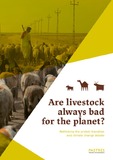| dc.contributor.author | Houzer, Ella | |
| dc.contributor.author | Scoones, Ian | |
| dc.date.accessioned | 2021-09-13T14:20:36Z | |
| dc.date.available | 2021-09-13T14:20:36Z | |
| dc.date.issued | 2021-09 | |
| dc.identifier.citation | Houzer, E. and Scoones, I. (2021) Are Livestock Always Bad for the Planet? Rethinking the Protein Transition and Climate Change Debate. Brighton: PASTRES, DOI: 10.19088/STEPS.2021.003 | en |
| dc.identifier.isbn | 978-1-78118-828-6 | |
| dc.identifier.uri | https://opendocs.ids.ac.uk/opendocs/handle/20.500.12413/16839 | |
| dc.description | This report is published in collaboration with the Alliance for Mediterranean Nature and Culture (AMNC), the Coalition of European Lobbies for Eastern African Pastoralism (CELEP), the Centre for Sustainable Development and Environment (CENESTA), the European Shepherds Network (ESN), the International Institute for Environment and Development (IIED), the International Livestock Research Institute (ILRI), the Italian Network on Pastoralism (APPIA), the League for Pastoral Peoples and Endogenous Livestock Development (LPP), the International Land Coalition’s Rangelands Initiative, the Spanish Platform for Extensive Livestock Systems and Pastoralism, Vétérinaires Sans Frontières (VSF) International, the World Alliance of Mobile Indigenous Peoples and Pastoralists (WAMIP) and the Yolda Initiative. This publication is in support of the International Year of
Rangelands and Pastoralists 2026. | en |
| dc.description.abstract | Urgent climate challenges have triggered calls for radical, widespread changes in what we eat, pushing for the drastic reduction if not elimination of animal-source foods from our diets. But high-profile debates, based on patchy evidence, are failing to differentiate between varied landscapes, environments and production methods. Relatively low-impact, extensive livestock production, such as pastoralism, is being lumped in with industrial systems in the conversation about the future of food.
This report warns that the dominant picture of livestock’s impacts on climate change has been distorted by faulty assumptions that focus on intensive, industrial farming in rich countries. Millions of people worldwide who depend on extensive livestock production, with relatively lower climate impacts, are being ignored by debates on the future of food.
The report identifies ten flaws in the way that livestock’s climate impacts have been assessed, and suggests how pastoralists could be better included in future debates about food and the climate. | en |
| dc.description.sponsorship | This report is part of the PASTRES (Pastoralism, Uncertainty, Resilience: Global Lessons from the Margins) programme, which has received Advanced Grant funding from the European Research Council (ERC) under the European Union’s Horizon 2020 research and innovation programme (Grant agreement No. 740342). | en |
| dc.language.iso | en | en |
| dc.publisher | PASTRES | en |
| dc.rights.uri | http://creativecommons.org/licenses/by/4.0/ | en |
| dc.subject | Agriculture | en |
| dc.subject | Climate Change | en |
| dc.subject | Environment | en |
| dc.subject | Rural Development | en |
| dc.title | Are Livestock Always Bad for the Planet? Rethinking the Protein Transition and Climate Change Debate | en |
| dc.type | Other | en |
| dc.rights.holder | Ella Houzer and Ian Scoones | en |
| dc.identifier.externaluri | https://pastres.org/livestock-report | en |
| dc.identifier.team | Resource Politics | en |
| dc.identifier.doi | 10.19088/STEPS.2021.003 | |
| rioxxterms.funder | Default funder | en |
| rioxxterms.identifier.project | PASTRES | en |
| rioxxterms.version | VoR | en |
| rioxxterms.versionofrecord | 10.19088/STEPS.2021.003 | en |
| rioxxterms.funder.project | 379919e8-ccf2-4422-82ea-776558ab8d73 | en |


